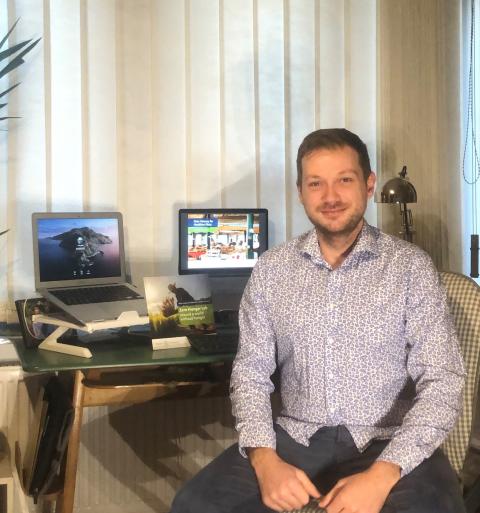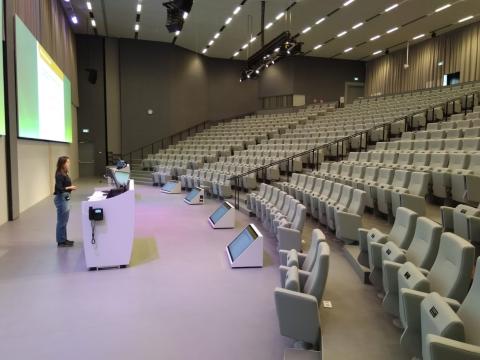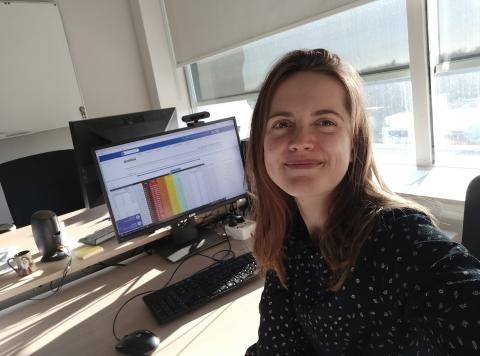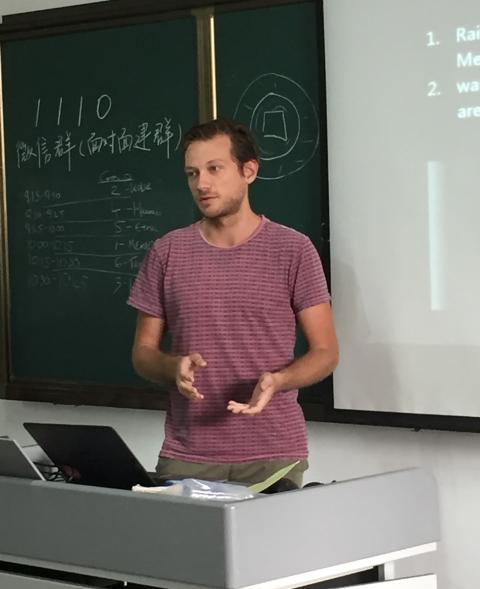A week with Eelke and Julius
Zero Hunger Lab researchers Eelke Bakker (26) and Julius Kaut (27) like giving their lives big twists. So, she will soon be cycling to Tajikistan, while he fantasizes about moving to Brabant, having previously lived in Myanmar, Norway, and Israel, among other places. Meanwhile, their minds travel to the Horn of Africa every morning. Why? The duo explains in this candid report of their week.
Monday
Eelke | 9:32 AM
Our Plan B goes into effect today. It feels good after months of preparation, but honestly? Plan A would have been even more exciting. In that case, I would have been on a stage in Uganda today, to give data- science training to East African agriculturists. Covid wasn’t the only thing that thwarted our plan. Arranging visas for all the participants from South Sudan and Somalia was at risk of becoming a bureaucratic nightmare. But scrap the courses? No way! They are the first pillar of the project that I’m working on with Julius. On behalf of the Zero Hunger Lab, we want to increase local clout in the Horn of Africa to prevent famines. So, we quickly had brochures distributed about our alternative: a customized video course. The first recordings will start soon. Here in Tilburg, that is. In a sweater and jeans, in a deserted lecture hall.
Julius | 2:20 PM
I hear the floor above me creak as my parents walk back and forth. I had hoped to live in Tilburg by now, but I underestimated the housing crisis in the Netherlands. So, for weeks I have been living and working in the basement of my parents’ new house in the German town of Durmersheim. I am now sitting at an old-fashioned school desk with two monitors on it. A window lets in some daylight. Outside flows the Rhine, and beyond that lies France. But in my head, I’m somewhere else. For months, Eelke and I have been working on the second pillar of our project: a paper in which we try to quantify food security in the Horn of Africa. This week, we hope to complete the first draft.

Tuesday
Eelke | 5:44 PM
It feels strange to have to talk enthusiastically to four hundred empty chairs. Normally, I like to look at the faces in the audience when I teach. All that frowning and whispering helps me assess whether my explanation of missing values is catching on, or whether I’m rambling on too much about clever use of color in data visualization. But you can get used to anything, as has been proved today. I’m not saying I’m going to launch my own YouTube channel, because I have yet to watch the footage and I’ll probably get annoyed with my wild gestures. But when my colleague Miriam was recently speculating about a podcast about data science... Well, that seems like fun. Now I have to finish my bowl of soup here at the university and then go back to my little room in Tilburg.

Julius | 6:50 PM
Surely being a farmer in Somalia is different from running a farm here near the Black Forest. Today, I delved into the disaster scenarios that they are struggling with there. Every year, floods and droughts can ruin the work of several seasons. And crops that do ripen successfully are often eaten by swarms of desert locusts. Still, I think famine is avoidable. We just need to learn to predict food scarcity better. But how do you know if a locust infestation is coming? That’s what Eelke and I are figuring out together.
Wednesday
Eelke | 4:18 PM
Horn of Africa. It even says whether a specific locust is a male or female. And what species it is. These kinds of sources can really help predict food shortages. Unfortunately, our search work doesn’t always run smoothly. Today, I also wanted to know: how many healthcare institutions are there in each province of Somalia? Impossible to find!
Julius | 5:29 PM
Tonight, a childhood friend from Karlsruhe is coming over to play pool with me here in the town center. I am going to ask him a question that I found the answer to today: how many armed conflicts have taken place in Somalia in the last two years? ACLED, an organization that records violent incidents around the world, puts it at exactly 5,000. For us, ACLED is a great resource, because food security and conflict are closely related. But numbers like these make my hairs stand on end.
Thursday
Eelke | 2:13 PM
Julius and I don’t have the same view of things. I mean that in a positive way. Today, we’ll look at each other’s chapters and treat each other to all kinds of suggestions. It doesn’t feel uncomfortable, because we both want our report to be the best it can be and are happy to complement each other. That’s one of the great things about the Zero Hunger Lab. Everyone here respects each other’s abilities.

Julius | 5:01 PM
Eelke once again has been keeping me super sharp today regarding the proper use of data. As a social scientist, in turn, I try to keep an eye on what we lose when we reduce reality to numbers. An example from my time in Myanmar: Western organizations had set up a large project there to help people with the number one problem on the ground: crime. But when relief workers went out into the neighborhoods, they discovered that no one cared. To them, there was something else that was more problematic about which there were no figures: dirty drinking water. We managed to shift the focus of our resources to changing the water. Unfortunately, humanitarian interventions sometimes miss the mark because of a lack of attention to local realities.
Friday
Eelke | 4.44 PM
I stared at Google Maps for a long time during my breaks today. Now that the article and training sessions are nearly complete, I am thinking more often about my next challenge. I want to bike to Asia. In 2019, I rode to Copenhagen by myself; last year I cycled through Switzerland. And soon I will first bike to Istanbul. There I’ll meet up with a Belgian girl, and we will continue our journey together through Iran to Tajikistan. I haven’t really trained yet, but that’s not a problem. Months of cycling will naturally improve your cycling fitness. I hope.
Julius | 6:12 PM
A blank canvas. That’s where we started. I’ve sometimes wondered: can we fill it as is expected of us? But now, when I see how our efforts have come together in sixty pages of analysis and recommendations, I feel proud. At the same time, I now know how many people are committed to making the world better little by little, yet the challenges we all face remain undiminished. Sometimes they even seem to increase. I think we must abandon the illusion that our work will someday be finished. But that doesn’t change my desire to complete great projects that truly benefit people. Hopefully, this was one of those projects.

Date of publication: 11 April 2022
